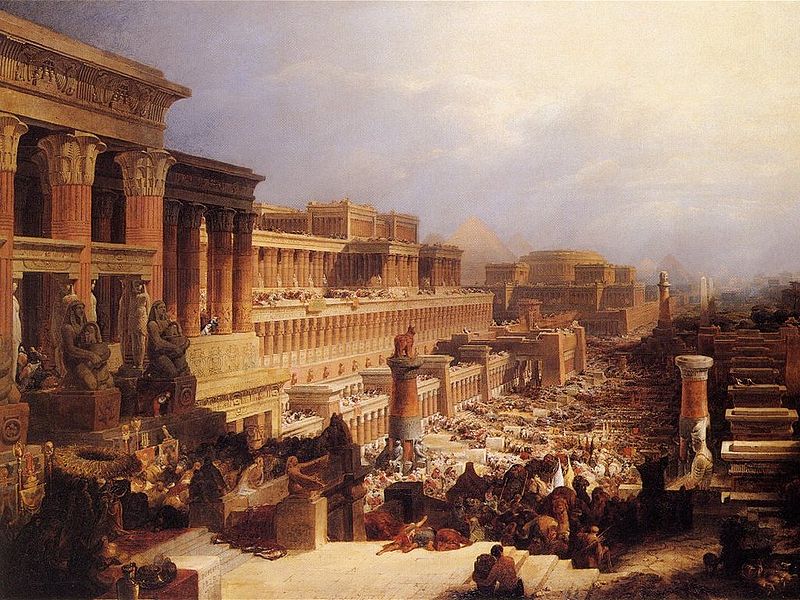People who know me or are even acquainted with me know that I worry—a lot—about almost everything. I become anxious over minor, insignificant matters. I overthink things. I often feel like things “just won’t work out” the way I hoped. Lots of people might be able to relate to this as they struggle with anxiety about their present situations or what the future might hold. Christians often struggle with anxiety over sin (issues of guilt, shame, and consequences). When my wife and I got married (to each other, just to clarify), I was working a new full-time job and working on my undergraduate B.A. full-time as well. I was constantly filled with anxiety about whether I would be able to finish school because most of the remaining classes I needed were scheduled at times which conflicted with my work schedule. I also had to complete a short internship in order to graduate. My wife almost never seems to worry or become anxious. I envy that. She always reassured me (as she still does to this day) that “things will work it and it will be fine.” “No,” I always thought to myself, “things will not be fine. I just don’t know what to do. It isn’t going to work out.” Sure enough, however, things worked out. Things were fine. Just before the semester(s) came to take those classes, my work asked me to change departments (for the better) and my schedule changed allowing me to finish school. I can remember countless times when this scenario played out. Some matters were more significant and complicated and others were minor (but seemingly impossible at times nonetheless).
Looking Back on Anxiety
One of the most popular biblical characters is Moses and one of the greatest biblical events is the Exodus—the deliverance of the Hebrews from Egypt. Moses’ name (Mosheh) was given to him because he was ‘drawn out’ (Mashah) of the river as a baby (Exod. 2:10).1 His name, like so many others in the scriptures, is seen to be ‘prophetic’ in that it depicts his character and looks forward to a significant event which he leads—the Exodus.
Much of the Hebrew Bible (i.e., the Old Testament) looks back to the Exodus.2 Psalm 106, like other Psalms (Ps. 78, 80:8ff, 81, 105), recalls the deliverance of Israel from Egypt along with proceeding events. It recounts Israel’s falling into sin and unbelief (which the Hebrew Bible often characterizes as ‘disobedience’). In verse 7 of Psalm 106 the Psalmist declares, “Our fathers in Egypt did not understand Your wonders; They did not remember Your abundant kindnesses, But rebelled by the sea, at the Red Sea.” God rescued them anyway, and “Then they believed His words; They sang His praise” (v. 12). The verses immediately following (v.13) sadly reveals, “They quickly forgot His works; They did not wait for His counsel.” They were punished for this (vv. 14–20) because “They forgot God their Savior, Who had done great things in Egypt, wonders in the land of Ham, And awesome things by the Red Sea” (v. 21–22). Finally, the Psalmist calls upon God for mercy and deliverance in their present sinful and distressed situation (vv. 23–48).
God prescribes remembrance of the Exodus event as a remedy for Israel’s anxiety at the thought of combating stronger nations, “If you should say in your heart, ‘These nations are greater than I; how can I dispossess them?’ you shall not be afraid of them; you shall well remember what the LORD your God did to Pharaoh and to all Egypt: the great trials which your eyes saw and the signs and the wonders and the mighty hand and the outstretched arm by which the LORD your God brought you out. So shall the LORD your God do to all the peoples of whom you are afraid” (Deut. 7:17–19).
While mention of Israel’s deliverance from Egypt permeates the scriptures, some other notable passages are worth briefly mentioning. Psalm 114 is very short and simply recounts the miraculous deliverance of Israel from Egypt. In similar fashion Psalm 135 praises the righteousness of God in remembering the Exodus event. The Exodus event is recalled in Daniel’s prayer before supplicating for Israel’s present situation in Babylonian captivity (Dan. 9:15ff).
Even in the midst of Torah being given to Israel, God cites the Exodus as an event to be recalled and as a significant factor which is integral to the functionality and identity of the Hebrew people: “So you shall keep My commandments, and do them: I am the LORD. You shall not profane My holy name, but I will be sanctified among the sons of Israel: I am the LORD who sanctifies you, who brought you out from the land of Egypt, to be your God: I am the LORD” (Lev. 22:31–33).3 Israel is to remember their deliverance and to exist in a manner which the Exodus event is a living memory amongst them.
The Passover event and annual celebration is itself a remembrance and ceremonial reenactment of the Exodus. In most traditional Pesach Haggadot (‘Passover Tellings’) the past (the Exodus), present (current exile among the nations), and future (coming of Moshiach/Messiah) are brought together as the Seder meal is celebrated. The participants thus focus on what God has done, is doing, and will do. The lesson is that each participant should consider himself/herself as having personally been delivered from Egypt. The results of this are spiritually therapeutic. Looking back on the Exodus reassures the Passover participant that (1) God is in control, (2) God knows what he is doing and there are reasons for the way things are currently, and (3) because God is faithful as can be seen from the past and present, he will remain faithful in the time to come and he will bring about deliverance and healing.4
For the Christian struggling with anxiety, participation in a Passover Seder is not herein being prescribed as a cure! However, the same principle which is at work in Israel’s scriptural history, in a Passover celebration, or in remembering the works of Jesus can be utilized to reduce worries and to help a person overcome struggling with anxiety.5 This principle is what I have aptly labeled Retrospective Reassurance… True, I could have gone with something like “The Principal of Looking Back,” but that just doesn’t sound nearly as cool.
The Effectiveness of Retrospection
I have to admit that what has helped me deal with anxiety the most has not been answered prayers for God to miraculously remove such feelings and worries. Neither has distracting myself with the enjoyments of foods, libations, entertainment, good company, or even spiritual fellowship. While I have not sought or required medication for anxiety (fortunately, as my degree of worrying is minor and due to known causes), I believe it would mainly help with symptoms and its effects would wane. I cannot imagine medication to be ultimately efficacious in developing me as a person or in providing me the natural abilities to reduce and manage anxiety for the rest of my life. I understand that some people have severe anxiety or have been diagnosed with a disorder for such and require medication and/or therapy, which I certainly would not deny. I can only speak for myself in this instance and possibly people who just struggle with day to day anxiety the way I do. Nevertheless, what has allowed me to progress with less anxiety and to grow in character has been taking a moment to recount the wonderful which God has accomplished in my life at times which seemed hopeless. I remember the times when circumstances happened to alter precisely as necessary during difficult situations. When I find myself in difficult circumstances or think about my uncertain future, I intentionally recall similar situations in the past when I worried and felt hopeless, yet things fell in place and worked out just fine. When I went through my graduate (M.A.) program I often found myself becoming extremely anxious over whether or not I would ever finish due to working full-time and schedule conflicts. These were the same scenarios I found myself in previously when I wondered if I would ever finish my undergraduate degree. When I felt anxious, I recalled the spectacular, dare I say, ‘miraculous,’ orchestration in my daily life which permitted me to graduate. It was effectively reassuring and I felt much more at ease. Sure enough, circumstances always changed at the right times for me also during my graduate studies and it all worked out. I finished. Just as the Israelites continually looked back on God’s miraculous deliverance in the Exodus event, so I strive to constantly engage in Retrospective Reassurance considering God’s orchestration in my life. This helps me to cope with and overcome feelings of hopelessness or anxiety.
Endnotes
- The etymology of Mosheh is disputed as really deriving from Mashah or a similar root. It is possible that Mosheh actually comes from another root word meaning something more like ‘child’ or ‘son’. Regardless of this, it is apparent that Mashah was used as an explanation for the name given. The significance here may be more of a play on words or homophone rather than etymological, cognate, or semantic relationship.
- It could be argued that much of the New Testament also presents Jesus as bringing about a ‘new’ Exodus and looks back to him and his work of deliverance in a similar fashion.
- Unless otherwise noted, all translations follow the NASB.
- It is appropriate to note here that the Christian might participate in a Passover celebration with an added focus and slightly different perspective about the coming of the Messiah. For the Christian celebrant, one also looks back on what Jesus has accomplished, is doing now in one’s life and the Church, and looks forward to his parousia. This, perhaps, is a topic for another time.
- Notice how I emphasize ‘struggling with’ anxiety and do not speak of anxiety itself. I do not think that anxiety can nor should be eliminated. Anxiety it a necessary human characteristic and I also happen to think that it is beneficial if addressed properly and harnessed. After all, anxiety about doing well in school helped me to go above and beyond in many cases and helped me to excel!





Leave a Reply
Your email is safe with us.